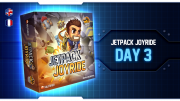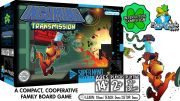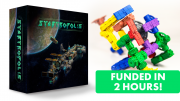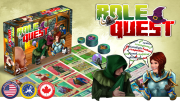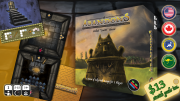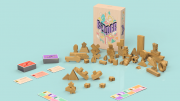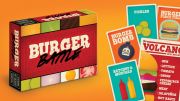Jetpack Joyride (Lucky Duck Games) – All players act simultaneously in this game, with no turns. Everyone is stealing a jetpack from a dangerous lab. Using transparent tiles from a common pool, you must plot your route out of the lab while avoiding traps and picking up coins for points. The game is real time but does not have a timer. Played over three rounds, each round ends when the first player leaves the lab. While you score points for finding the best path through the lab, you also score points for completing mission cards on your way out. At the end of each round, players draft items which will carry over into future rounds and give you special perks and abilities.
Casual Game Crowdfunding: Jetpacks and Space Stations

There’s a lot of science fiction this month on Kickstarter, with a jetpack-themed app game getting a board game adaptation, a cooperative game set on a malfunctioning space ship, and a competitive game in which players build a 3D space station as they also build up their revenue.
Incoming Transmission (Magic Meeple Games) – In this cooperative deductive puzzle game, one player is Mission Control and the remaining players take the role of the cadet stuck on a space ship that is about to be destroyed. Mission Control knows which tiles the cadet must move next to each other in order to save the ship. Each turn, Mission Control hands the Cadet five shuffled cards with the actions he wants the cadet to take. The players in charge of the cadet must decide which order to execute these actions in: moving around the board, repairing tiles, picking up tiles, and setting them down again. Each round a transmission card is drawn which may temporarily improve communication between Mission Control and the cadet or deteriorate it. You can read our preview of the game here.
Startropolis (Petersen Games) – In this 3D board game, players are working together to build a space station, but only one player will win the game by acquiring the most wealth. Each round, players buy space modules and attach them to the space station, affecting their end of round revenue. Different module types will score in different ways, some earning points for the number of modules attached to them, for example, while others require unique module types to increase their worth. A single module may change its revenue worth between rounds as different modules are added to the station. The richest player at the end of the game wins. You can read our first impressions of the game here.
Role Quest (Hercules Game Studios) – In this role playing party game, players take on the role of fantasy characters such as a mayor or innkeeper. Each round you move around the town and meet up with another player, you then each select a roleplay card in your hand which will give your character a secret personality, such as patronizing or corrupt. The different locations in the town have different effects on the scene you are roleplaying, and a third player will set the scene based on the characters interacting and the location they are in. After the scene is acted out, players attempt to guess the two characters' secret personality traits. Other players can also play curse cards on the players before they act out a scene, forcing them to do things like speaking in rhyme, singing, or speaking in a deep tone.
The Abandons (Puzzling Pixel Games) –The Abandons is a simple solo game. You begin on the start card, and add new cards to the labyrinth, drawing them from the deck. The goal of the game is to burn through the deck and reach the exit card. Each door icon on your current card shows how many cards are drawn if you go through that door. If it says one, you draw one and flip it face up adding it to the labyrinth adjacent to that door. However, you also many have to draw more cards. For example, if it tells you to draw three, you discard the first two facedown and the third card you draw is the one that is added to the labyrinth. Some cards you draw from the deck are item cards which you set aside until you choose to use them. Multiple items are shown on the card and each item requires you to discard a certain number of item cards in order to use that item. If you are ever stuck in the labyrinth, and all paths lead to dead ends, you lose.
Bilder (Monkeyshine Games) – Each round a different player is the builder. He draws a What card and chooses one of the two choices on the card. This is what he will be building. He may then choose from one of the face up How cards on the table, which will impose restrictions on him while he builds (such as limiting the pieces he can build or forcing him to only use one hand). There are multiple wooden shapes, objects, and figures that you can use for building. As the player builds, the other players will try to guess what it is he is creating. If someone correctly identifies the building, she earns the What card, while the builder earns the How card. You can read our preview of the game here.
Burger Battle (Andrew Heath) – Players are racing to build their burger before any other player manages to complete theirs. At the start of the game you are dealt a burger card which lists the eight ingredients that your burger needs. Every player also starts the game with five cards in their hand. Cards include ingredients and battle cards (special ability cards that can be played on yourself or on your opponents). Players keep their burger cards face up so everyone knows what type of burger you are trying to build and what ingredients you need. On your turn you can draw a card either from the deck or from the top of the discard pile. Then, if you have an ingredient that your burger needs, you play it and draw another card. You repeat this until you no longer have an ingredient that your burger needs. You then end your turn by either discarding a card or playing a battle card.
Disclosure: unless otherwise noted, we have not seen or played any of the above games. Our assessment of each is based on the information given on the crowdfunding project page.




